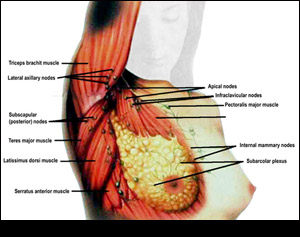Breast cancer patients'' emotional health affects their exercise patterns
 Washington, Apr 22: Emotional health plays a very important role in influencing exercise patterns in breast cancer patients, according to a new study.
Washington, Apr 22: Emotional health plays a very important role in influencing exercise patterns in breast cancer patients, according to a new study.
The study found that patients with greater depressive symptoms and a lower emotional quality of life are less likely to exercise as part of their recovery than are patients reporting less distress.
The study, which monitored physical activity in breast cancer patients for five years, suggested that there''s a need to concentrate on breast cancer patients'' emotional health soon after they are diagnosed.
In the study, researchers followed 227 women who had participated in a previous clinical trial in which they were randomised to receive either a year of psycho-educational counselling or standard breast cancer follow-up assessments and treatment.
All the women in the study had been diagnosed with stage II or stage III breast cancer and surgically treated.
They were assessed at the start of the study and 12 additional times over five years to evaluate health status, symptoms, fatigue, health-related quality of life, depressive symptoms, social support and physical activity.
It was found that overall, the women as a group increased their physical activity during the first 18 months after diagnosis and treatment, but then their physical activity gradually declined over the remaining three and a half years.
Poor physical health also was associated with less physical activity over all five years.
On the other hand, family support appeared to slow the decline in physical activity over the last 42 months of the study.
Depressive symptoms can include low mood, low energy, sleep difficulty and a lack of interest in, or withdrawal from, normal activities.
Emotional quality of health is a broad composite measure of social and psychological factors, including mood, tension and the presence or lack of social support.
"This suggests that stress in the form of depressive symptoms is related to actual health behavior over a sustained period of time," said Charles Emery, professor of psychology at Ohio State University and lead author of the study.
He added: "We know from other studies that exercise is associated with generally better quality of life, usually lower symptom reporting, and enhanced health outcomes in women with breast cancer. These data suggest that depressive symptoms are associated with low exercise activity, providing further evidence in support of the need to evaluate and address depressive symptoms early in the course of illness and treatment."
The study also reinforced the idea that sticking to an exercise plan is not easy, even for those expecting physical activity to aid in recovery from a serious illness.
"These data suggest that the presence of a very significant life-threatening health problem was not enough to encourage maintenance of an exercise program," said Emery.
He added: "It''s great that participants report an increase in exercise activity, but the fact that there is a subsequent decline is not a good sign. We need to consider future interventions to minimize this decline."
The research is published in the April issue of the journal Psycho-Oncology. (ANI)